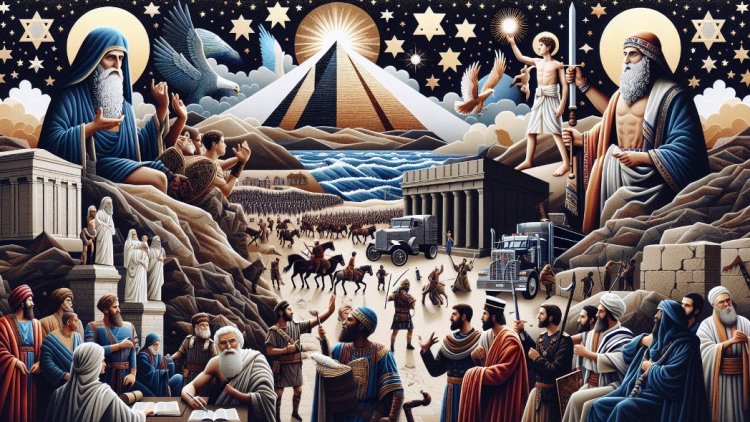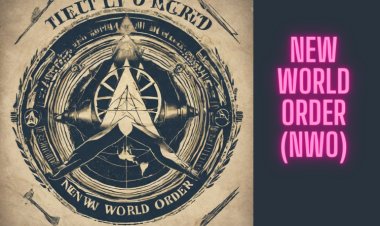The Real History of Israel and the Jews: Unraveling Myths and Facts
Uncover the truth behind the complex and often misunderstood history of Israel and the Jewish people. Separate fact from fiction, explore ancient origins and unravel the myths that have shaped modern perceptions.

Introduction
In this blog, we will unravel the myths and facts surrounding the real history of Israel and the Jews. By exploring the transcript of the video, we can gain a deeper understanding of the purpose behind this blog and the importance of understanding the history of Israel and the Jews.
Purpose of the Blog
The purpose of this blog is to provide accurate information and dispel misconceptions about the history of Israel and the Jewish people. It aims to shed light on the historical events that have shaped the region and its significance in current affairs.
Overview of the Transcript
The transcript provides a comprehensive narrative of the history of Israel and the Jews, starting from the time of Abraham and tracing the journey of the Israelites through various empires and conflicts. It highlights key events such as the establishment of the Temple in Jerusalem, Roman rule, and conflicts with neighboring nations.
The Importance of Understanding the History of Israel and the Jews
Understanding the history of Israel and the Jews is crucial for comprehending the complex dynamics of the region and the ongoing conflicts. It allows us to recognize the deep-rooted connections of the Jewish people to their ancestral homeland and appreciate the historical context in which current events unfold.
Ancient Origins: From Abraham to Solomon
The ancient origins of Israel and the Jewish people traced back to the time of Abraham, a nomadic visionary who believed in one god. Despite facing challenges and setbacks, Abraham persistently held onto his belief, which eventually laid the foundation for the first Israeli startup—a belief in monotheism.
After residing in Egypt for a period of time, the Israelites found themselves enslaved by the Egyptians. It was during this time that Moses, a great leader with a questionable sense of direction, emerged and led the Israelites on a journey to Canaan, their ancestral homeland.
During this journey, Moses climbed Mount Sinai and received the Ten Commandments, a moral code that would shape the principles and values of the Israelites. These commandments served as a guide for their society and reflected their belief in a just and righteous way of life.
After settling in Canaan, the Israelites faced constant conflicts with the Philistines, a people of Greek heritage. One of the most notable events during this time was the epic battle between David, a diminutive shepherd, and the giant Goliath. David's victory solidified his position as a leader and eventually led to his anointment as king.
Under the rule of King David's son, Solomon, the first temple was constructed in Jerusalem, solidifying the city as the capital of Israel. The temple served as a central place of worship and played a significant role in the religious and cultural lives of the Israelites.
However, the first temple faced its destruction at the hands of the Babylonians. The majority of Jews were forced into exile, marking a significant turning point in their history. After 50 years in exile, the Jews were liberated by the Persians and allowed to return home. They built a new temple atop the ruins of the first, symbolizing their resilience and determination to rebuild.
Throughout their ancient history, the Israelites faced various invasions and occupations, including those by Alexander the Great and the Romans. These foreign rulers shaped the political landscape of the region and influenced the cultural and religious practices of the Jewish people.
Despite these challenges, the Jews maintained a strong connection to their ancestral homeland and continued to build their society according to their own ideals. This connection is deeply rooted in their aboriginal rights and their uninterrupted presence on the land for over 3,000 years.
From Abraham to Solomon, the ancient origins of Israel and the Jews set the stage for their rich and complex history. Understanding these origins provides valuable insights into the deep-rooted connections of the Jewish people to their homeland and the historical context in which current events unfold.
Roman Rule and Exile
The period of Roman rule had a significant impact on the Jewish population and their homeland. It began with the conquest and destruction of the second temple in Jerusalem, which was a devastating blow to the Jewish people. The temple held great religious and cultural significance, and its destruction marked a turning point in Jewish history.
Following the destruction of the temple, the Jewish population experienced a period of exile and liberation by the Persians. After 50 years in exile, the Jews were allowed to return home and rebuild their temple. This act symbolised their resilience and determination to maintain their religious and cultural identity.
The influence of Greek culture and the revolt against Antiochus also played a significant role during this time. Antiochus, a Greek king, sought to impose Greek customs and beliefs on the Jewish people, which led to a revolt by the Jews. They fought to preserve their own religious practices and ultimately emerged victorious.
However, the Jewish population faced continued challenges under Roman rule. The Romans scattered the Jewish population throughout their empire, leading to a diaspora of Jews across various regions. This scattering had a profound impact on the Jewish people, as they were forced to adapt to new environments and communities.
Despite the challenges and dispersion, the Jewish people maintained a strong connection to their ancestral homeland. Their aboriginal rights and uninterrupted presence in the land for over 3,000 years solidified their connection to Israel.
The Roman rule and scattering of the Jewish population set the stage for the next chapter in Jewish history, as well as the ongoing struggles and conflicts in the region. Understanding this period provides valuable insights into the challenges faced by the Jewish people and the resilience that has defined their history.
Birth of Christianity and Islamic Conquests
The birth of Christianity and the Islamic conquests played significant roles in the history of Israel and the Jews. These events shaped the religious and cultural landscape of the region and had lasting impacts on the lives of the Jewish people.
The birth of Jesus and the growth of Christianity
In Bethlehem, a Jewish baby named Jesus was born, and he would go on to become the central figure of Christianity. Although Jesus preached a message of love and peace, he was accused of sedition by the Roman authorities and sentenced to death. Despite his crucifixion, Jesus' teachings continued to spread and gain followers.
Christianity, the religion founded on the teachings of Jesus, grew over time and became a separate faith from Judaism. It brought forth new beliefs and practices that differed from traditional Jewish customs. The growth of Christianity led to the development of a new set of sacred texts and a distinct religious identity.
Islamic conquests and the building of the Al-Aqsa Mosque
After the death of Muhammad, the founder of Islam, his followers embarked on a series of conquests. These conquests resulted in Muslim control of the land of Israel and the establishment of the Al-Aqsa Mosque in Jerusalem.
The Al-Aqsa Mosque was built atop the ruins of the first and second Jewish temples, making it one of the holiest sites in Islam. This construction symbolized the religious and cultural significance of Jerusalem for both Jews and Muslims.
Persecution of Jews in the Middle Ages
In Europe, the Middle Ages were characterized by a widespread persecution of Jews. Jews were often blamed for various societal problems, such as the Black Death and economic hardships. This led to random killing sprees, mob riots, expulsions, and other forms of persecution.
During this time, the Crusades also took place, with Christian crusaders attempting to conquer Jerusalem from Muslim control. While the original goal was to recapture the holy city, the Crusaders resorted to violence against both Muslims and Jews upon their success.
Saladin, a Kurdish leader, later took control of Jerusalem from the Christian crusaders. His actions demonstrated that the conflict in the region was not solely between Jews and Muslims, but rather a complex power struggle involving various parties.
Overall, the birth of Christianity and the Islamic conquests had profound effects on the Jewish people. They contributed to the development of new religious traditions, the construction of iconic religious structures, and periods of persecution and turmoil. Understanding these historical events is crucial for comprehending the complex dynamics of the region and appreciating the resilience of the Jewish people throughout their history.
The Modern Era: Zionism and the Creation of Israel
In the modern era, the Zionist movement played a crucial role in increasing immigration to Israel and the eventual creation of the state of Israel. The Zionist movement, founded by Theodor Herzl in the late 19th century, aimed to establish a homeland for the Jewish people in their ancestral land of Israel.
Zionist movement and increased immigration to Israel
The Zionist movement gained momentum in the early 20th century, leading to a significant increase in Jewish immigration to Palestine, which was under Ottoman rule at the time. Jewish immigrants, known as pioneers or "halutzim," arrived in Palestine with the vision of building a new Jewish society and reclaiming their ancestral homeland.
These pioneers faced numerous challenges, including harsh living conditions and conflict with the Arab population. However, their determination and perseverance drove them to establish agricultural communities, known as kibbutzim, and develop the infrastructure necessary for the future state of Israel.
San Remo Conference and the British mandate
In 1920, the international community recognized the Zionist aspirations at the San Remo Conference. The conference allocated the mandate for Palestine to the British, with the explicit purpose of establishing a national home for the Jewish people. This decision was later endorsed by the League of Nations.
Under British rule, Jewish immigration to Palestine continued to increase, as did tensions between the Jewish and Arab communities. The British, facing pressure from both sides, struggled to maintain peace and manage the conflicting national aspirations in the region.
Arab attacks and Israel's fight for independence
Following World War II and the Holocaust, the urgency to establish a Jewish state grew stronger. However, the Arab population, fearing a Jewish majority in Palestine, vehemently opposed the establishment of Israel.
In 1947, the United Nations proposed a partition plan that would divide Palestine into separate Jewish and Arab states. The Jewish leadership accepted the plan, but the Arab states and Palestinian leadership rejected it, leading to a series of violent attacks on Jewish communities.
In 1948, Israel declared its independence, and neighboring Arab states launched attacks to prevent the establishment of the Jewish state. Despite being outnumbered and outgunned, Israel successfully defended itself and even expanded its territory.
The war resulted in a significant displacement of Palestinian Arabs, with some fleeing or being forced to leave their homes. This event, known as the Palestinian Nakba, or "catastrophe," remains a deeply contentious issue in the Israeli-Palestinian conflict.
Since its establishment, Israel has faced ongoing challenges and conflicts in its quest for security and peace. However, it has also experienced remarkable growth and development, becoming a thriving democratic nation and a global leader in various fields, including technology, innovation, and agriculture.
The modern era of Zionism and the creation of Israel have had a profound impact on the Jewish people, the Middle East region, and the international community. Understanding this history is crucial for comprehending the complexities of the Israeli-Palestinian conflict and the ongoing pursuit of peace in the region.
The Israeli-Palestinian Conflict
The Israeli-Palestinian conflict is a complex and long-standing issue that has shaped the history of the region. It is important to understand the key factors and events that have contributed to this conflict.
Creation of the Palestinian Liberation Organisation (PLO)
The Palestinian Liberation Organization (PLO) was established in 1964 by the Arab League. Its main goal was to mobilize and unite the Palestinian people in their struggle against Israel. The PLO played a significant role in shaping the Palestinian national identity and advocating for their rights.
Arab rejection of peace agreements and continued terrorism
Despite various peace agreements proposed by Israel, the Arab states and the Palestinian leadership consistently rejected these offers. This rejection and the ongoing terrorism perpetrated by extremist groups have hindered progress toward a peaceful resolution of the conflict.
The use of terrorism as a tactic by certain groups, such as Hamas, has resulted in significant loss of life and has further deepened the divide between Israelis and Palestinians. Acts of violence and terrorism have frequently undermined efforts to promote peace.
Israeli self-defense and the Gaza withdrawal
Israel, in its quest for self-defense and security, has undertaken various measures to protect its citizens from terrorist attacks. This includes the construction of security barriers and the implementation of strict security measures.
In 2005, Israel unilaterally withdrew from the Gaza Strip in an effort to promote peace. However, instead of leading to stability, this withdrawal resulted in the establishment of a terrorist base in Gaza, with groups such as Hamas launching rocket attacks against Israel.
The ongoing conflict between Israel and the Palestinians has had a profound impact on the lives of both Israelis and Palestinians. It has resulted in the loss of countless lives and has created deep divisions and animosity between the two communities.
Efforts to find a lasting solution to the Israeli-Palestinian conflict continue, with international mediation and peace talks taking place. However, the road to peace remains challenging, and both sides must be willing to make significant compromises in order to achieve a peaceful resolution.
Israel Today: Facts and Misconceptions
Israeli society and diversity
Israel is a diverse and multicultural society, home to people of various ethnic, religious, and cultural backgrounds. Over 20% of Israel's population is made up of Arab Palestinians, who have full and equal rights, including representation in government, the judiciary, and other sectors. Israeli society is vibrant and pluralistic, with individuals from different communities living and working together.
False claims of apartheid and occupation
The claims of apartheid in Israel are unfounded and misleading. The apartheid system in South Africa was a state-sanctioned policy of racial segregation, whereas Israel is a democratic country that guarantees equal rights and protections to all its citizens. Arab Israelis have the same rights as Jewish Israelis, including the right to vote, access to education and healthcare, and freedom of religion.
Similarly, the claim of occupation is often misused. Israel gained control of certain territories as a result of defensive wars, and disputes over these areas are rooted in complex geopolitical and historical factors. Israel has repeatedly expressed its willingness to negotiate and reach a peaceful resolution with the Palestinians, but the rejection of peace agreements and ongoing acts of terrorism have hindered progress.
Palestinian response and misuse of foreign aid
The Palestinian leadership has consistently rejected peace agreements and refused to engage in meaningful negotiations with Israel. Instead, they have resorted to acts of terrorism and incitement, which have only deepened the divide between Israelis and Palestinians. This rejection of peace has caused immense suffering for both sides and hindered the prospects of a lasting resolution.
Furthermore, there have been reports of the Palestinian Authority misusing foreign aid for purposes other than improving the lives of its people. Funds intended for infrastructure development and humanitarian assistance have been diverted to support convicted terrorists and their families. This misuse of aid hampers efforts to promote peace and prosperity in the region.
The Path to Peace
The Israeli-Palestinian conflict is a longstanding issue that has caused immense suffering and division in the region. However, there is hope for a future Palestinian state and a path towards peace.
Hope for a future Palestinian state
Many people, including world leaders and international organizations, support the establishment of a Palestinian state alongside Israel. This two-state solution aims to create peaceful coexistence and self-determination for both Israelis and Palestinians.
By recognizing the rights and aspirations of the Palestinian people, there is hope that negotiations and diplomatic efforts can lead to a mutually agreed-upon solution that respects the sovereignty and security of both nations.
Role of world leaders and the United Nations
World leaders, including those in influential positions, play a significant role in facilitating peace negotiations and promoting dialogue between Israelis and Palestinians. The United Nations, as an international body, has been actively involved in mediating and advocating for a peaceful resolution to the conflict.
Through diplomatic efforts and international pressure, world leaders and the United Nations can encourage both parties to come to the negotiating table, address key issues, and find common ground for a lasting peace agreement.
The importance of mutual recognition and cooperation
One crucial aspect of achieving peace is the mutual recognition and cooperation between Israelis and Palestinians. Both sides need to acknowledge each other's right to exist, security concerns, and aspirations for self-determination.
Building trust and fostering a spirit of cooperation are essential for creating an environment conducive to peace. This includes promoting economic cooperation, cultural exchanges, and joint projects that benefit both communities.
Through dialogue, compromise, and a commitment to peaceful coexistence, Israelis and Palestinians can work together toward a future where both nations can thrive and live side by side in peace and security.
Conclusion
-
Summary of Key Points:
In this blog, we unravel the myths and facts surrounding the real history of Israel and the Jews. We explored the ancient origins of Israel, from Abraham to Solomon, and the challenges they faced throughout their history.
We discussed Roman rule and exile, the birth of Christianity and the Islamic conquests, the modern era of Zionism, and the creation of Israel. We also touched on the Israeli-Palestinian conflict and the importance of seeking peace and understanding in the region.
-
The importance of seeking the truth and dispelling myths:
It is crucial to seek the truth and dispel myths surrounding the history of Israel and the Jews. By understanding the historical events and the deep-rooted connections of the Jewish people to their ancestral homeland, we can gain a more accurate perspective of the region's complexities.
Dispelling myths and misconceptions also allows us to challenge prejudice and engage in informed discussions about the Israeli-Palestinian conflict. It is essential to approach this topic with an open mind and a commitment to understanding the perspectives of all parties involved.
-
Encouragement to explore further:
This blog has provided a brief overview of the history of Israel and the Jews. However, there is much more to explore and learn about this complex and fascinating topic. We encourage you to delve deeper into the historical records, engage in respectful conversations, and seek diverse perspectives to gain a comprehensive understanding of the region's history and current affairs.
By continuing to educate ourselves and remaining open to different viewpoints, we can contribute to a more informed and constructive dialogue about Israel, the Jewish people, and the pursuit of peace in the Middle East.



 admin
admin 










